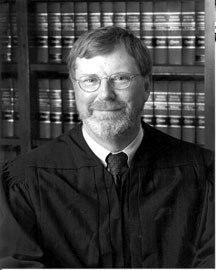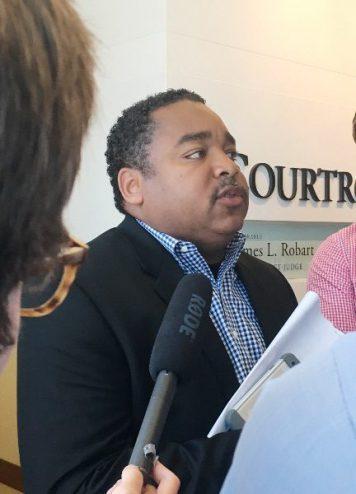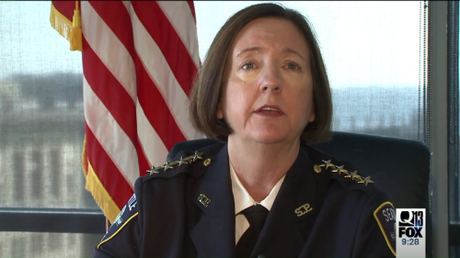
Judge Robart
Via Seattle Times: U.S. District Judge James Robart, pointedly reacting to the Seattle police union’s rejection of a tentative contract, said Monday he would not let the powerful labor group hold the city “hostage” by linking wages to constitutional policing.
“To hide behind a collective- bargaining agreement is not going to work,” Robart said during a dramatic court hearing he opened by laying out a path for police-accountability reform and closed with an emotional declaration that “black lives matter.”
Robart, who is presiding over a 2012 consent decree requiring the city to adopt reforms to address Department of Justice allegations of excessive force and biased policing, called for major changes that would directly affect the union’s membership: streamlined appeals of officer discipline and internal investigations conducted by civilians rather than sworn officers.

SPOG President Kevin Stuckey
Kevin Stuckey, who recently became president of the Seattle Police Officers’ Guild (SPOG) in a power shake-up and listened in court to the judge’s blistering remarks, said the union is prepared to sit down with the city and reach a deal. “The judge has given us our marching orders,” Stuckey said, insisting the union’s vote this summer to reject the deal was not tied to money but to the leak of confidential contract details to The Stranger newspaper.
Guild members — officers and sergeants — voted 823 to 156 this summer to reject a contract containing a mix of wage hikes and reforms, an outcome one source attributed to too many giveaways without enough in return.
Other sources previously said former SPOG President Rich O’Neill, who in 2008 won big pay raises in exchange for reforms, led the campaign against the package. O’Neill’s effort indirectly led to Robart’s tongue lashing, during which he said he might formally intervene if he concludes the guild is interfering with reform.
“The court and the citizens of Seattle will not be held hostage for increased payments and benefits … ,” Robart said, adding, “I’m sure the entire city of Seattle would march behind me.” (Oddly enough, no one ever holds the teachers accountable for “holding the kids hostage” when they routinely go on strike [illegally] in Washington State.)
Robart, at the same time, praised the city’s overall reform effort, saying the Police Department had adopted sweeping changes. It has become a national model for de-escalation tactics, he said, and put in place successful crisis intervention techniques, use-of-force reviews and added training on bias-free policing.

Seattle Police Chief O’Toole
He said that the work is not done and that strong leadership is required. “I think we have the right person to do that in Chief O’Toole,” Robart said of Kathleen O’Toole, who listened from the audience.
Last week, Robart issued an order allowing the city to draft police-accountability legislation, as long as he reviews it before it is submitted to the City Council to make sure it does not conflict with the consent decree.
During Monday’s hearing, he provided a blueprint for what he would like to see in the legislation, based on various proposals produced by city officials, the Community Police Commission (CPC) and the court-appointed federal monitor, Merrick Bobb.
Beyond changes to appeals and internal investigations, Robart said he wants the position of civilian director of the Office of Professional Accountability, which handles internal investigations, to be strengthened. He said the city should create the position of inspector general, to be held by a civilian with broad oversight powers. O’Toole, Robart said, should retain the final word on disciplinary decisions.
City Attorney Pete Holmes, speaking for the city, pledged to complete legislation for Robart’s review by Labor Day. Holmes said the city would have to reconcile legislation prepared by Mayor Ed Murray with proposals submitted by the CPC, a temporary citizen-advocacy body created as part of the consent decree.
Robart has clashed in the past with the CPC over its attempt to become a permanent body and expand its powers, saying that can’t be done without the court’s approval. On Monday, Robart said he would not find the CPC in “contempt” over its release last week of a proposed police-accountability ordinance. But he said it went too far. “Some of your provisions cross the line,” he said, citing legitimate input versus management of the department.
Murray is expected to submit a framework for a community oversight panel, but it might be different from the body envisioned by the CPC.
In comments after the hearing, CPC member Isaac Ruiz said the commission was glad Robart established a path forward. “We’ll definitely take the judge’s words … to heart,” Ruiz said, explaining the proposed ordinance was only meant to be recommendations.
The Rev. Harriett Walden, the CPC’s co-chair, said the commission would work with the mayor’s office on drafting a package, with the hope Murray will recommend the CPC be made permanent.
Robart ended the hearing with deeply personal remarks, in which he noted a statistic that showed, nationally, 41 percent of the shootings by police were of blacks, when they represented 20 percent of the population.
“Black lives matter,” he said, drawing a startled, audible reaction in a courtroom listening to the words coming from a federal judge sitting on the bench.
He also said the recent shootings of police officers, including in Dallas, Baton Rouge and, in 2009, of four Lakewood, Pierce County, officers, reflected the importance of the work being done to heal police and community relations.
DCG

